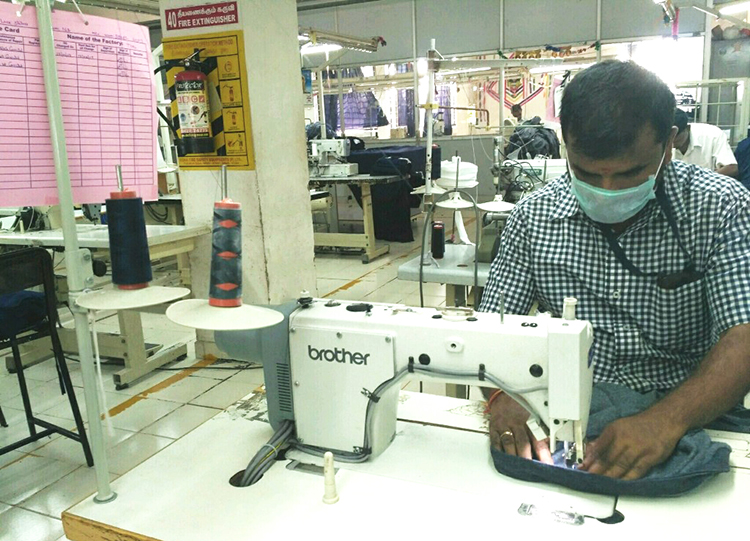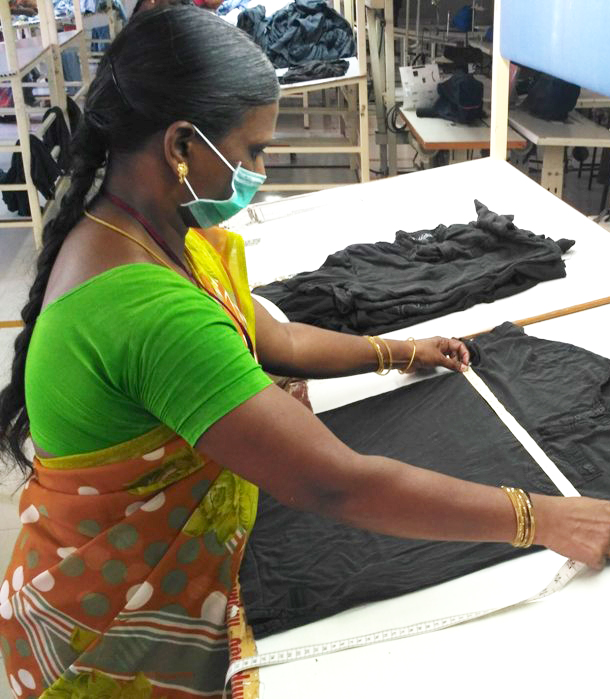Meet the Makers: art & eden
art & eden childrenswear is made by Texport Industries who run a number of social initiatives, trying to improve the lives of their employees and the towns in which they work. Some of their programs include providing additional vocational training for their garment workers, hosting free medical camps every quarter, running a free hospital and employing and supporting differently abled persons.
K. Sreenivasan, Tailor (31 yrs old)
K. Sreenivasan has been working as a tailor at Texport Industries for over ten years. He lives with his wife, Vanitha Mani, and their two children.
Born in Sengottai, India, K. Sreenivasan grew up with his parents and went to a government run school in their town. He later moved to Tirupur to help his grandfather with agricultural work while attending the local government high school.
Similar to the disparity between public and private education in the United States, a large learning and resource gap exists between government run and private education in India. In most cases, if a family can afford to send their children to a private school, they do. As Vikas Bajaj and Jim Yardley reported in their New York Times article on Indian education:
In India, the choice to live outside the faltering grid of government services is usually reserved for the rich or middle class, who can afford private housing compounds, private hospitals and private schools. But as India’s economy has expanded during the past two decades, an increasing number of India’s poor parents are now scraping together money to send their children to low-cost private schools in hopes of helping them escape poverty.
Many government schools struggle to provide adequate electricity, functional resources and educational resources, let alone small class sizes and high quality teaching.
Thus, when K. Sreenivasan joined the workforce instead of going to college at the age of 20, it was a natural next step for him. His parents later joined him in Tirupur and helped him get a job as an office boy. Soon after, he was introduced to Texport Industries where he was hired as a tailor helper. He told us, “Gradually I learned the job of Tailor and gained a thorough knowledge of flatlock, overlock and singer work.”
He married his wife when he was 25 and they went on to have a son and daughter. Today, their son, Deebakkumaran, is eight years old and their daughter, Vidhya, is three.
Despite the lack of access to private education and opportunity, K. Sreenivasan keeps a positive attitude. He is optimistic about the future and finds joy in his daily life.
Every morning, K. Sreenivasan drops Deebakkumaran and Vidhya off at school before continuing on to work. He rides his two-wheeler scooter to the factory, a situation he calls “perfectly suitable because [his] residence is nearby, within 30 minutes!”
K. Sreenivasan takes pride in his work. He told us: “I am a very good tailor. I know flatlock, overlock and singer in all types of machines. [I also] support my team members to execute the buyer’s needs.”
For lunch, K. Sreenivasan rides his scooter home to “take full meals with pure vegetables with [his] family members.” After work, he returns home to help his wife with household duties. Then together they support their kids with homework and get them ready for school the next day. Some evenings, K. Sreenivasan takes his children to Karate and yoga classes, activities he tells us are very popular right now in his hometown.
For his own fun, K. Sreenivasan reads newspapers and watches T.V. “I am always memorizing the film songs and taking my family to the cinema for their entertainment!” he says.
When asked about his ambitions, he said, “My ambition is to make an orphanage home for at least 10 children.” He also added that he wants to make his family cheerful, always!
S. Malar, Checking Department (41 yrs old)
S. Malar has worked at Texport Industries for over six years. She likes the location of the factory because she lives close by, only twenty minutes away. She said the short distance lets her finish all of her housework in the morning and get to the factory in a peaceful manner.
S. Malar was born and raised in Thuraiyur, India where she attended the government girls school up through high school. Like K. Sreenivasan, she began working immediately afterward, doing household work and local jobs in town.
She married at 21, had her first son when she was 23 and had a daughter two years later, a relatively average timeline for many women in India, particularly in smaller, less metropolitan cities. In rural villages and areas where women do not have a chance to receive any education, marriage age can be significantly younger (many are married before 18, the legal marriage age).
Today, S. Malar lives with her husband, son and daughter. Her son, S. Dinesh Kumar, is twenty years old, currently getting his bachelors in mechanical engineering. Her daughter, S. Saranya, is seventeen years old and studying in a school close to their home. Ambitious and determined, S. Malar works hard to give her children the education and opportunities she wasn’t able to have herself. She tells us proudly: “They are the number 1 students in their classes because [in] my after duty hours, I fully engage with them for their studies.” When they aren’t all studying hard, S. Malar spends time with them “by watching T.V., [attending] other cultural programs and supporting them in their basic needs.”
S. Malar has a packed morning during the working week. She has a routine similar to many women responsible for working and running the household. This is what her daily morning schedule looks like:
- Wake up at 6:00 am
- Prepare the family’s morning tiffin (breakfast)
- Cook mid-day meals for the family
- Get the children ready for school and college
- Help husband get ready for work
- Leave for the factory
Even though she has long days and works hard, S. Malar knows she can rely on her and her husband’s combined income to keep them secure. She says: “Our earnings are sufficient for the family’s needs and our children’s education.”
When asked about her ambitions, she said, “My future dream is for our children to become an engineer and lawyer and to improve the status of our family to a better level.”
About art & eden
Susan Correa, founder and CEO of art & eden, has spent her entire career in the apparel industry. She knew first hand the result of low-price competitiveness and quick turn-around pressures in the fashion industry: it created an industry model of as cheap and as fast as possible, no matter the cost. What was that cost?
The environment. The rights and protection of factory workers. Fair wages. Quality materials. Caring for the earth and for the people on it.
When Susan founded art & eden, she was determined to pave a new path, one that was better for people and better for the planet. She refused to hire or collaborate with anyone who didn’t share the same vision, insisting that heart come first, that art & eden be mission-based, not profit-based.
She decided to produce art & eden’s children’s clothing line with Texport Industries after visiting their factories and seeing first-hand their safe, clean and healthy work environment. She was impressed with the positivity and the supportive energy she witnessed at the factory.
Note: The above interviews were conducted by Mr. Ramalingam, Administrative Manager of HR at Texport Industries, and written/transcribed by Nandita Batheja, writer and program facilitator at art & eden.










